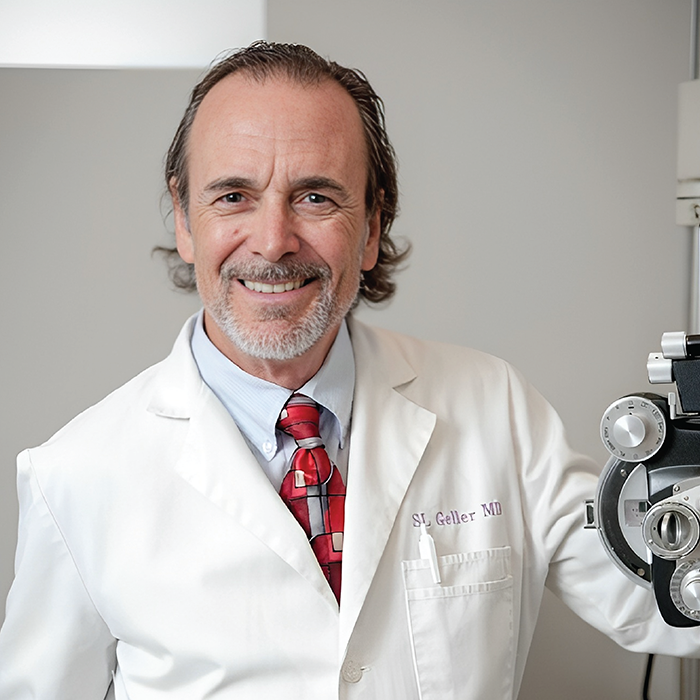
Credit: Headshot supplied by author
The rules of medicine: 1. Do no harm. 2. Listen to the patient.
It was a simple, typical case – a 74-year-old female who had been under my care for about five years and was finally ready to proceed with surgery on her +2 nuclear sclerotic cataract.
Staff had performed the usual workup and I was sitting with the patient and her spouse, giving my verbal informed consent, documenting it in the chart, and reviewing the staff's measurement of corneal curvature (check against refraction!), A-scan ultrasound calculation, and optical biometry of intraocular lens implant power (check against +2 hyperopic refractive error!). In short, I was making sure all the usual stuff was done.
“Dr. Geller, my eyes will still be big after surgery, won’t they?” said the patient.
“Yeah, sure – your eyes will be big after surgery,” I answered.
It was one of those “stream of consciousness” responses to a statement/question that made no sense to me. (“Sure, your eyes will be big, small, blue, round – whatever!”)
“Let’s see now, everything’s in order – biometry, implant power calculation, postoperative prescriptions.” My mind is on other things.
It was a routine operation, nothing unusual during the procedure, nothing unusual during the postop. Two weeks down the line, the patient’s uncorrected visual acuity was 20/50. It wasn’t a flawless refractive result, but it was certainly within the acceptable range, and it was even slightly on the myopic side.
Her postop spectacle correction was -1.25 ( myopic/nearsighted ), and even though her opposite eye was +1.25 (hyperopic/farsighted), I was sure the patient would get by well enough until the opposite eye was done, which I anticipated within one year.
A week after dispensing the postop spectacles, however, I was confronted by a less than happy patient. “Doctor, my eye isn’t big.” An icy premonition went through my brain. “Your eye isn’t big? You have an excellent result. Your corrected vision is 20/20. What do you mean?”
“You remember before the surgery, I asked you if my eye was going to be big, and you said yes!” (Oh yes, I do remember!) What I considered just an inane comment was a very specific question from the patient. I was so compulsive about what I considered the important part of our discussion that her comment just went in one ear and out the other.
Myopic patients require minus-power (concave) lenses for correction and, to the casual observer, eyes with such spectacles will look smaller. Hyperopic patients require plus-power (convex) lenses for corrections and, in this case, the observer sees an eye that looks larger.
“Doctor, my right eye is big but my left eye is small now. I want my eyes big again,” said the patient.
“Oh, you don’t really want that,” I said. “Without glasses you can just about read perfectly, you can take off your glasses and watch TV. When we get to the other eye, both eyes will work together really well. I will make sure that the right eye is perfectly clear for distance.” I remind myself to recheck and compare that right eye A-scan ultrasound calculation! “You’ll actually be able to see without glasses for most activities.”
“But Dr. Geller, I want glasses. I want my eyes to be big.”
I shuddered – one unhappy patient negates 10 happy ones!
I told the patient to think about what I’d said, but on a follow-up visit several weeks later her request was still the same – she wanted her big, hyperopic corrected eyes again. She liked the way it made her look. I had to do something. I could always do a lens exchange, but the prospect of another major surgery and its attendant risks was not something I really wanted to jump into. And since I would be charging Medicare, as would the surgery center, I could sense the patient’s potential resentment for the fee that I would feel I deserved, even though (as most patients would believe) I made a “mistake.”
So, what to do? I said, “Let’s have you come in next week and I’ll do an ‘adjustment’ on your cornea so you can have a big eye again.” I provided the patient a (very) quick rundown of the “risks and benefits” and documented it in the chart.
At this point, to younger ophthalmic surgeons, I would say, yes, there are legitimate uses for radial keratotomy (RK) in ophthalmology, and this case was one of them. I don’t know if RK is still being taught, but it should be in every ophthalmologists' armamentarium. I fear we will have a whole generation of ophthalmologists who are too scared to actually do it…
The next week we brought the patient into the minor surgery operating room and performed a four-incision RK – something I would do to reduce myopia, rather than overcorrect and induce hyperopia – without any problem. A few weeks later, after refractive stabilization, the patient was a +1.00 hyperope. A flawless (at last) result!
“Dr. Geller, I’m so happy with my eye now! I think I’m going to have the other eye done in a month or two.”
My mentor, the late Saul Sugar, MD – a brilliant ophthalmologist – once said to me, “Geller, you look but you do not see!” Now, I realize the same applied to my hearing – I heard the patient, but didn’t listen!
Read more about Scott Geller’s practice at vitreousfloaters.com

Credit: The Ophthalmologist
